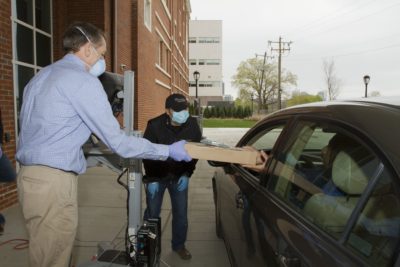

Christopher St-Hilaire dropped out of high school at 15 years old. After dropping out, he spent a good deal of time just doing whatever he wanted —including playing video games until four or five in the morning. But at some point St-Hilaire realized that he wanted to make something of himself.
“I knew I needed to go back and start over again, and the first step in that process was getting my GED,” said St-Hilaire. His restart began at Central Piedmont Community College, where he eventually graduated with an associate degree. Now, St-Hilaire is a first-year transfer student at Princeton University.
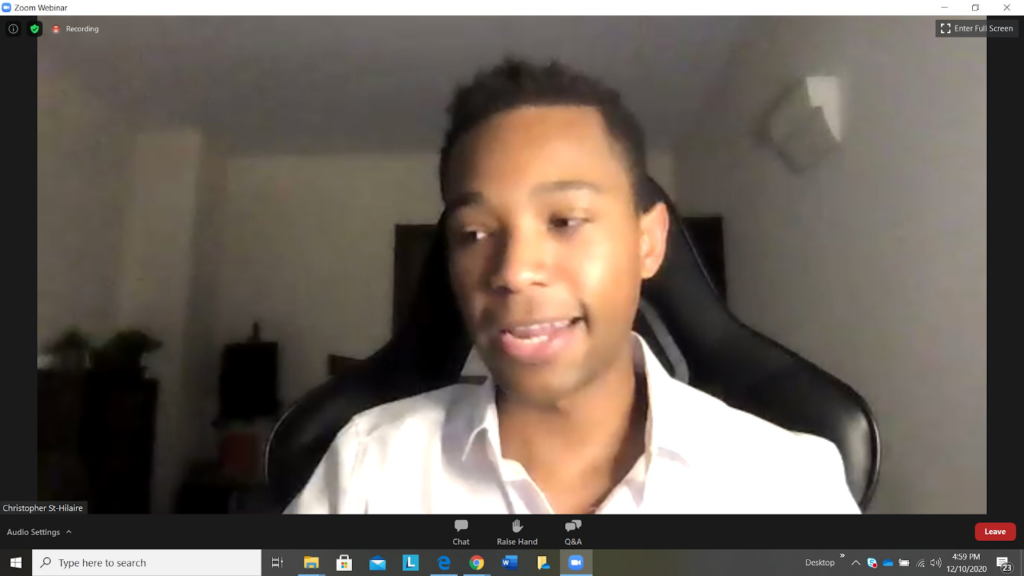

On December 10, 2020, St-Hilaire joined three other panelists — Michael Denning, Xavier Johnson-Graham, and Jordan McLean — to discuss the African American male student perspective at North Carolina community colleges. Hosted by APCO Worldwide and moderated by APCO consultant Demetrius Deloatch, panelists gathered online to facilitate a peer-to-peer conversation about why community colleges can be a good choice for students right now.
Success in higher education can lead to stable and rewarding careers —significant during a time when the economy is in flux. But across the nation, community colleges are facing declining enrollments. And in North Carolina, the largest declines in enrollment are among Black males.
The four panelists are all current students or graduates of North Carolina community colleges. They all have different reasons why they decided to start their academic careers at a community college.
For Denning, a graduate of Wake Technical Community College, attending Wake Early College of Health Sciences gave him the chance to earn college credit while in high school. Denning earned a nursing assistant certification, an associate of science, and an associate of arts. He transferred to a four-year university and earned a bachelor’s of science in public health and a master’s in business administration. After taking a year off, Denning went on to Columbia University, earning a master’s in public health. Now, he is a first-year medical student at the Brody School of Medicine.
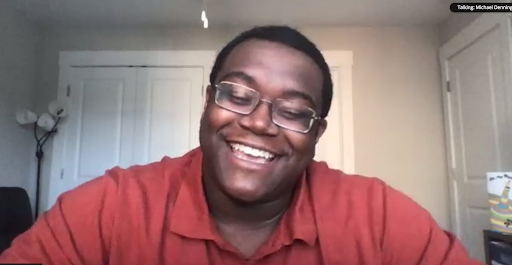

Like Denning, Johnson-Graham’s community college experience started in high school. Johnson-Graham earned his associate of arts and later transferred to East Carolina University to pursue a communication degree. When the pandemic hit, Johnson-Graham returned to Nash Community College and is now working on a credential in broadcast technology and production.
Each of the men stated that finances played a role in their decision-making process. For McLean, a current student and student government association vice president at Fayetteville Technical Community College (FTCC), finances made FTCC a top choice.
“It was a more practical option because of cost and transportation. And at the same time, I could do community college and be at home as much as possible to deal with health concerns, not just for myself, but also for my family,” said McLean.
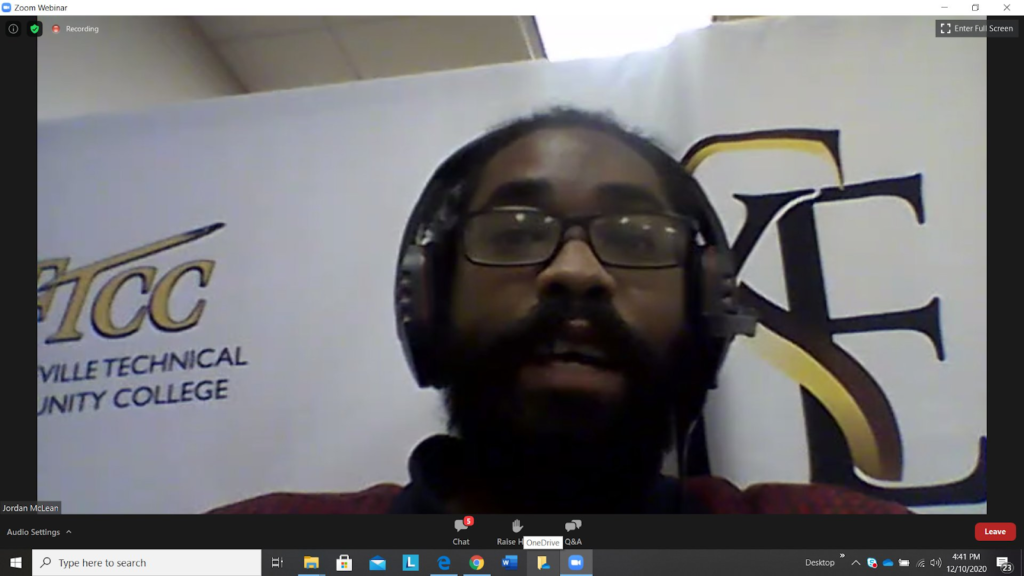

Many students attending community colleges experience barriers that impede their progress, whether those are the entry into college, classroom work, or completion. Deloatch asked each panelist if they had experienced any roadblocks during their college career. For Denning, it was navigating a system that was unfamiliar to him.
“You’re fresh out of high school or fresh off the workforce, and you’re now in a different system that you might not necessarily know a lot about. That was kind of the biggest challenge for me,” said Denning.
Johnson-Graham said his roadblocks occurred in the classroom. “I had trouble, especially with subjects like Spanish, English, writing, and math — especially math. That was definitely one of my biggest roadblocks,” said Johnson-Graham.
For McLean and St-Hilaire, their roadblocks were more personal. McLean’s chronic health problems and St-Hilaire’s perfectionism were challenges that could have hindered their completion.
But community college faculty and staff helped remove some of those roadblocks, they said. Each of them credited the community college with helping them grow and make progress.
“At the community college, I had tons of teachers that knew me by name, knew my face. And they are always there to help. One thing I love about community colleges is that teachers take not only their personal time, but their instructional time to pause the class and help you with something you may be struggling with,” said Johnson-Graham.
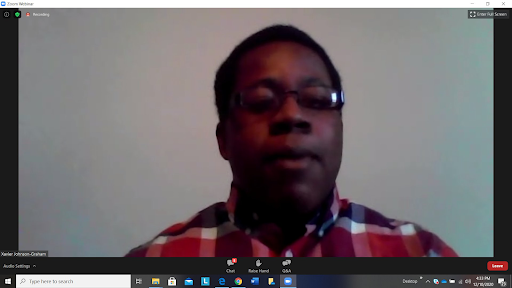

St-Hilaire admitted he was an introvert and the small class sizes at the community college were perfect for him. “It’s such a great environment for you to develop a relationship with your professors. There are a few just coming to mind now that I am still in contact with today,” said St-Hilaire.
During the panel, a college administrator asked the panelists how college faculty can support Black males and promote a sense of belonging and inclusion. St-Hilaire responded, “I really just think being there as a beacon or being there as a supportive platform can go a long way and really make someone feel included and make someone have a sense of agency.”
“Just keep in mind that we are not monolithic,” McLean said. “We are all individuals. Yes, we all fall under that label but at the same time, all our stories are different as each of the panelists and I have shown. So just listen a bit more, and I would say, try to show a bit more compassion.”
Denning said cultural competency and making subjects more inclusive and relatable are important. “I was taking a math class, and the instructor was talking about buoyancy and getting out on a boat. I don’t get on boats. We can talk about this in another way. It’s simple things like that that you could switch or make a little bit more inclusive and a little bit more understanding for students,” he shared.
At the end of the panel discussion, Deloatch highlighted the importance of representation at community colleges. “Community colleges need to employ people that look like us. You learn by example. As Black men, we learn from what we see. It’s a lot easier for us to go to somebody that looks like us and pour it all out and think that hey, they might understand it.”
He continued with advice for non-Black faculty and staff members. “Your active listening skills are what is going to play a very big part because 2020 has been traumatizing for more reasons than one. You never know what somebody is dealing with at home. By the time you pile on what they’re dealing with at home, what they’re seeing on the news, what they’re seeing in the streets, the difficulties that they’re always having or already having, and then I come to a community college — I’m the only one of my own there, and I can’t talk to anybody.”
Just before the panel discussion wrapped, a college administrator asked about the most effective outreach methods for the Black community.
“Start early. Start early. Start early,” said Denning.


